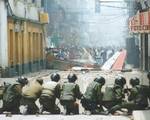 一間總部設於美國舊金山的全球性營建公司-貝希特爾(Bechtel),在2000年4月曾因玻利維亞自來水公司民營化,而引發科恰班巴市(Cochabamba)的民眾抗爭事件,欲迫使該公司退出玻利維亞。今日比奇特爾公司與當地政府達成協議,放棄向玻國政府索賠5,000萬美元的仲裁案。
一間總部設於美國舊金山的全球性營建公司-貝希特爾(Bechtel),在2000年4月曾因玻利維亞自來水公司民營化,而引發科恰班巴市(Cochabamba)的民眾抗爭事件,欲迫使該公司退出玻利維亞。今日比奇特爾公司與當地政府達成協議,放棄向玻國政府索賠5,000萬美元的仲裁案。
本案係源於貝希特爾和其主要合資者──西班牙的阿本哥(Abengoa)公司,於世界銀行設立之國際投資爭端解決中心(ICSID)提起爭端仲裁案,要求對造負擔2,500萬損害賠償和2,500萬虧損賠償。經過四年多來世界各地民眾持續向該公司抗議後,這兩家公司決定放棄高額的違約求償,只收取象徵性的款項。
玻利維亞水權運動領導人之一的奧利維拉表示:「跨國公司想把每樣東西都導入市場。對本地人來說,水並不是商品,而是公共財。對玻利維亞而言,貝希特爾的讓步表示人民權利是無可異議的。」
這項引起爭議的水資源特許經營權的協議是從1999年9月3日生效,當時玻國政府核准貝希特爾子公司Aguas del Tunari為特許經營人,為科恰班巴市提供各項水服務。到了2000年4月10日,由於民眾對Aguas del Tunari服務之爭議加溫,抗爭越演越烈,該項特許經營權才告終止。
故事回溯到1997年之時,當年世界銀行要求玻國政府將該國第三大城卡恰邦布市的公共供水系統私有化,做為援助玻國水利開發建設的條件。
1999年9月,在只有一名競標人的情況中,貝希特爾子公司Aguas del Tunari獲得卡恰邦布市40年的經營特許權。但該公司在接收後數週內,即調高水費達50%,甚至在某些案例中,水價調高比例更是驚人。
水價飆升帶來了憤怒群眾的抗議。,有約50萬居民的卡恰邦布市因為全面罷工而停擺三次之多。玻國政府為保障貝希特爾合約,隨即宣布戒嚴並展開搜捕行動,陸續於深夜到抗議活動領導人家中逮人。鎮壓行動中一名未武裝的17歲男孩軍隊槍擊,另至少有175人受傷。
2000年4月,貝希特爾被迫離開玻利維亞,而水公司也轉回公營。
2001年11月,貝希特爾與其合資企業向ICSID提起爭端仲裁,ICSID禁止大眾和媒體出席調解程序,並嚴禁揭露證人身分。
四年多來,市民團體持續發起全球抗爭活動,對貝希特爾施壓,要求該公司撤回此案。抗議群眾兩度包圍癱瘓貝希特爾在舊金山的總部大樓,而公司主管則飽受批評的電子郵件轟炸。此外,來自43個國家的市民團體連署向世界銀行提出請願,要求此案應開放公眾參與。
位於美國華府的非營利公益法律事務所「地球正義」的律師華格納表示:「最終的結果證明了公眾參與的力量。」「可惜除了本案以外,還有數百件外國投資公司對付開發中國家的案子仍懸而未決;如果美國等大國持續強迫其他國家給予外國公司特權,像這樣的案件還會更多。」華格納說:「我們必須繼續努力,拆除這類國際間商業仲裁的秘密與壟斷之牆」。
Bechtel, a global engineering and construction company based in San Francisco, today reached agreement with the government of Bolivia, dropping a legal demand for $50 million after a revolt over privatizing water services in the city of Cochabamba forced the company out of Bolivia in April 2000.
Bechtel and its chief co-investor, Abengoa of Spain, had been seeking $25 million in damages and $25 million in lost profits in a case filed before a World Bank trade court, the International Centre for Settlement of Investment Disputes (ICSID). Following four years of international public protest aimed at the companies, Bechtel and Abengoa agreed to abandon their case for a token payment.
"Multinational corporations want to turn everything into a market," said Oscar Olivera, a leader in the Bolivian water revolt. "For indigenous people water is not a commodity, it is a common good. For Bolivia, this retreat by Bechtel means that the rights of the people are undeniable."
The concession agreement dates from September 3, 1999, when the government of Bolivia approved Aguas del Tunari as the concessionaire to provide water services to the city of Cochabamba. On April 10, 2000, the concession was terminated because of the civil unrest, giving rise to a dispute between Bolivia and Aguas del Tunari.
In 1997, the World Bank made privatization of the public water system of Bolivia's third largest city, Cochabamba, a condition of the country receiving further aid for water development.
That led, in September 1999, to a 40 year concession granted to a company led by Bechtel in a process with just one bidder. Within weeks of taking over the city's water, Bechtel’s Bolivian company, Aguas del Tunari, raised rates by more than 50 percent and in some cases even higher.
The water price hikes were met with angry public protest. Cochabamba, a city of about 500,000 people, was shut down by general strikes three times. In an effort to protect the Bechtel contract, the Bolivian government declared a state of martial law and began arresting protest leaders at their homes in the middle of the night. An unarmed 17 year old boy was shot and killed by Bolivian Army personnel. At least 175 others were injured.
In April 2000, Bechtel was forced to leave the country and the water company was returned to public ownership.
In November 2001, Bechtel and its associates filed their case with ICSID at the World Bank. The ICSID process bars the public and media from being present at its proceedings or disclosing who testifies.
For four years, citizen groups waged a global campaign to pressure Bechtel to drop the case.
Protesters closed down Bechtel's San Francisco's headquarters twice. Company officials were bombarded by critical e-mails. Citizen groups from 43 nations endorsed a legal petition to the World Bank demanding that the case be opened to public participation.
"This settlement demonstrates the power of public participation," said attorney Martin Wagner of Earthjustice, a nonprofit, public interest law firm based in Washington, DC. "Unfortunately, hundreds of foreign investor challenges against developing countries remain pending and more will be filed as the United States and others continue to force governments to give foreign corporations special privileges," Wagner said. "We must continue to tear down the walls of secrecy and exclusivity in international commercial arbitrations like this one."





